Artists Eat (at my house): J.C. Hallman, Many Apples
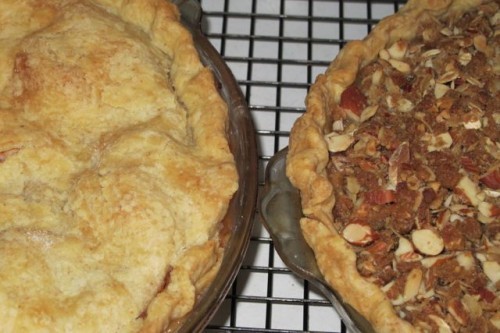
Each day, these days, a sweet, earthy fall smell rises from my kitchen as I chop, chop, chop into chunks and slices the apples that Rick and I trekked to my parents' farmhouse to pick.
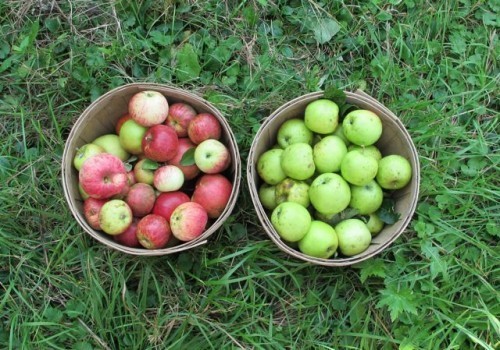
Two bushels is, in retrospect, a lot of apples. Half McIntosh, half what my mother calls Yellow Translucent (which lean toward Granny Smith), these apples come from uncoddled trees, and because of that some years the apples are good, some years they're bad. This year being the best year for picking in my memory. Rick, up on the ladder, threw good-sized, plump apples at me for hours, as I then gently lobbed them into baskets. Four pies, 6 pints of chutney, 3 jars of jelly, and 3 loaves of apple-walnut bread later, I still have 2 dozen left.
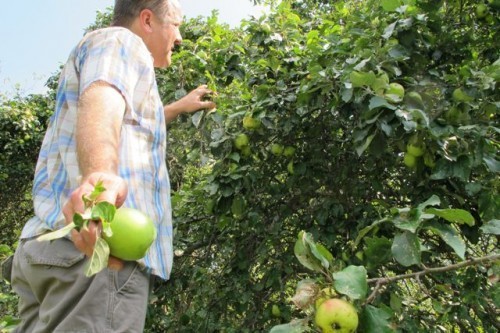
So, it was with 2 apple pies that I greeted J.C. Hallman when he visited from Oklahoma the other night with his wife Catherine and friend Carmen. I added writer Marc Nieson and his wife, dancer Beth Corning, their daughter Gigi, and the poet Joy Katz to the desserty mix.
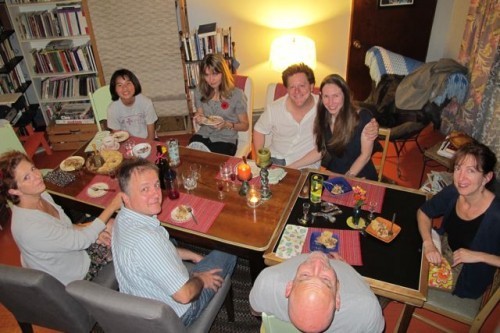
The first pie, made with McIntosh, was a traditional double-crust with thinly sliced apples tucked inside the tightly sealed top and bottom. Light on the sugar with a hint of cinnamon. With the tarter apples, I put together a crumble-topped apple custard pie laced with a hint of cardamom.
J.C. was in town because his essay "Spate and Spite" received second prize in Creative Nonfiction's "That Night" contest judged by Susan Orlean. About the essay, which will be published on CNF's website, Orlean says: "Evoking the tattered world of Atlantic City, a place of perpetual night, this piece fused reporting (about a 'spate' of suicides in town) with a vivid first-person narrative."
We have a tiny house and 9 is the most I've ever entertained here. By adding a vintage card table to the end of our farm table and pulling in the kitchen chairs from the floor below—it worked.
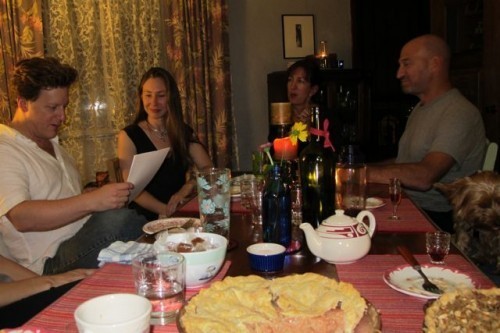
J.C., who goes by Chris if you know him well, read an essay he'd written especially for the night about the James brothers and their theories of chewing (included below). As we took seconds, more aware of our mouths and molars, Rick broke out the rhubarb-blueberry vodka I'd infused earlier in the summer, more red wine, and (our new house drink specialty) another shaker of bourbon brambles. Gigi had some nice cinnamon tea.
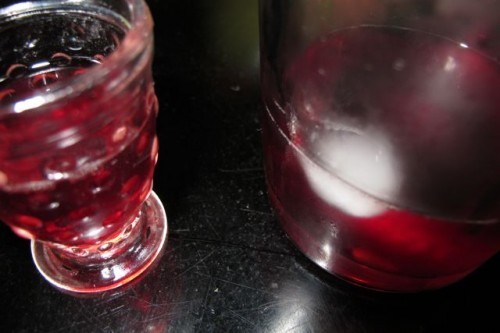
Comfortable and cozy conversation ensued. As well as some slow, deliberate chewing.
THE ART OF CHEWING
or
How Righteous Chew Guru Horace Fletcher Murdered the Inveterate Muncher William James
By J.C. Hallman
For Henry James, the human mouth was useful first and foremost as the bell that finally expelled the sounds that the literally conspiring organs of the body – lungs, vocal chords, etc. – produced so as to shape the various tones and harmonies of our speech. The mouth's secondary (and unfortunate) vocation was to serve as intake mechanism for sustenance, a vulgar process that left dirtied and crumb-flecked an otherwise precious instrument. The mouth's dual roles were never made clearer to James than when he happened, on a trip to America after a quarter century spent in England, to find himself on a Chicago train seated near a family just coming home from the opera, where "Parsifal" was then playing. The family was dually engaged on the ride. On the one hand, they chatted out their Wagnerian experience. On the other, they were, as James put it, "occupied after the manner of ruminant animals." They were a family of gum-chewers, all of them, and while opera "might be their secondary care the independent action of their jaws was the first." James was scandalized at the proposed view of a "gentleman rolling his bolus about while he talked to a lady, or…a lady who rolled hers…while he was so engaged." American society had sunk so low as to become a world in which men and women eternally chewed in one another's faces.
Chewing was better employed, James seemed to believe, as metaphor – to ruminate, after all, was to think. He'd used this tool himself. In 1890, when his brother William James published his magnum opus Principles of Psychology, Henry employed masticatorial allusion to explain the impending chore of its more than one thousand pages. "It will be a tough morsel for me to chew," Henry wrote, "but I don't despair of nibbling it slowly up."
William understood. Some years later, he called Henry's attention to a piece he himself had written about the American occupation of the Phillipines, a clever essay in which he mined his medical training's comprehensive knowledge of the body's digestive process for just the right metaphor to expose the folly of colonization. Surely, William suggested, we had prehended, or taken into our mouth, our opponent quite well. We had deglutted, chewed and swallowed, them even better. But could we be said to have truly digested or assimilated them? Hardly! Henry agreed: the imperial adventure would never amount to a satisfying meal. In his reply he happily extended his brother's metaphor: it would be "a long day before we…revomit the Phillipines."
It was only two days after Henry belched this out that William wrote with the most unusual of suggestions: chewing – actually chewing food – just might solve the digestive problems that had plagued Henry for almost all of his life.
"I am sending you a book by Horace Fletcher," William wrote. Fletcher was a food guru, and "Fletcherism" was a fad nutritional theory that claimed that the extensive chewing of one's food – at least thirty-two chews for all bites, including liquids, at a rate of one hundred chews per minute – produced increased bodily strength on a dramatically reduced overall diet. Even though both brothers were past sixty years of age, William thought Henry a perfect candidate for this "art of chewing" and he promised his brother a "great revolution in [his] whole economy." William planned to become a "muncher" too.
Given Henry's aversion to public chewing, one might suspect he would not shine to such a scheme. One could "Fletcherize" in private, however. Henry dismissed Fletcher's more grandiose claims, but otherwise dug right in. "To have eaten one meal, one only, really according to his rites," Henry wrote to his brother, "is to be disposed to swallow him at least whole."
Henry muched happily for quite some time. After two months, he was star-struck. "[Fletcher is] immense," he wrote, "thanks to which I am getting much less so." That July brought faint signs of trouble. First, Henry realized that he had less begun to lose weight than merely arrest its gain. Second, Fletcherism was every bit as boring as the tedious walks he hoped it would displace. Indeed, one could find one's mind wandering while exhaustively chewing, and wind up swallowing by mistake. Even more difficult was attempting to read at table. Henry came up with a range of questions he wished to pose to Fletcher, and asked William to introduce him. Their first meeting left him "happy in his guts."
Both brothers gnawed away a number of years on Fletcher's system. Eventually, however, Henry was driven by bouts of "pectoral trouble" to visit an actual doctor. The doctor prescribed exercise, which Henry had abandoned completely. "Fletcherism lulled me," he admitted, "charmed me, beguiled from the first into the luxury & the convenience of not having to drag myself out to eternal walking." He'd been so won over by Fletcher he'd begun to think "non-walking more & more the remedy."
On February 13, 1909, Henry sent William the shortest letter of their more than eight-surviving bits of correspondence. There was no salutation. "Stopped fletcherizing practically well – Henry."
"Poor Horace Fletcher!" William replied. Fletcher feared of what would happen to his business if it got out that Henry James had abandoned him. The two met again, this time for ten days. Henry was duly impressed. By his count, Fletcher subsisted on a small meal of Welsh Rabbit only once every forty-eight hours, and often ate only a third of his portion. Henry was inspired to recommit himself to a more "consistent and holier" Fletcherism.
The new effort lasted only a couple of months, and at first Henry wouldn't even detail what was wrong except to say that he had reached "defiantly & unmistakeably, the finally proved cul de sac or defeat of literal Fletcherism." He spelled out the ongoing crisis twelve weeks further on in a passage of characteristic stream-of-consciousness:
But my diagnosis is, to myself, crystal clear – & would be in the last degree demonstrable if I could linger more. What happened was that I found myself at a given moment more and more beginning to fail of power to eat through the daily more marked increase of a strange and most persistent & depressing stomachic crisis: the condition of more & more sickishly loathing food. This weakened & undermined & and "lowered" me, naturally, more & more – & finally scared me through rapid & extreme loss of flesh & increase of weakness & emptiness – failure of nourishment. I struggled in the wilderness, with occasional & delusive flickers of improvement…& then 18 days ago I collapsed and went to bed.
William and his wife were so moved by this note they finalized plans for a long-delayed visit. Ever ready with a medical opinion, William recognized the symptoms his brother described as those of one starving to death. The same letter noted that William's own health was on the wane – he reported an onset of dyspnoea, troubling breathing, though he believed it was not cardiac in origin.
Now under a doctor's care, Henry began to improve long before his brother and sister-in-law arrived to tend to him. It was a battle. The effort to re-learn to eat was a greater strain than the chewing cure had become. His gut had been left "intensely enfeebled & perverted"; it had forgotten how to digest anything. But now that he was chewing properly again, he had seen gains. His stomach came home from its "long adventure," and he told his brother that "all anginal symptoms have quite left me since beginning to disFletcherize."
He apologized for his previous note's all-too-dire tone. "I am still flushed with the sad consciousness of the pretty wild wail I addressed you from Rye," he wrote. He admitted that it was at least in part driven by a "great yearning" to see his brother. "Your advent," he wrote, "that will be my cure."
Which perhaps it was – Henry stopped Fletcherzing and lived another six years. William was less fortunate. Transatlantic travel had always laid him low, and when he arrived in England to rescue his brother, his own pneumatic symptoms advanced. He tried the baths at Nauheim; nothing worked. It was his heart, after all. He was now diagnosed with "aortic enlargement," and he noticed that his feet had begun to swell, his organ not strong enough to push the blood up from his toes. Henry improved such that he was well enough to travel back to America with William, when it became apparent they should flee the continent. They arrived home just in time. William died peacefully but prematurely. He himself had stopped "munching" long, long before, but the cure he'd once prescribed for his brother became a curse, and it found its way back to him in the end. ##
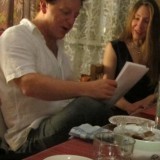
J.C. Hallman wrote about the history of the Slow Food Movement in the latest of his nonfiction books, IN UTOPIA: Six Kinds of Eden and the Search for a Better Paradise. More about his career can be found at JCHallman.com, and more about the correspondence of William and Henry James can be found at williamandhenryjames.blogspot.com.
Sherrie Flick's Blog
- Sherrie Flick's profile
- 38 followers



